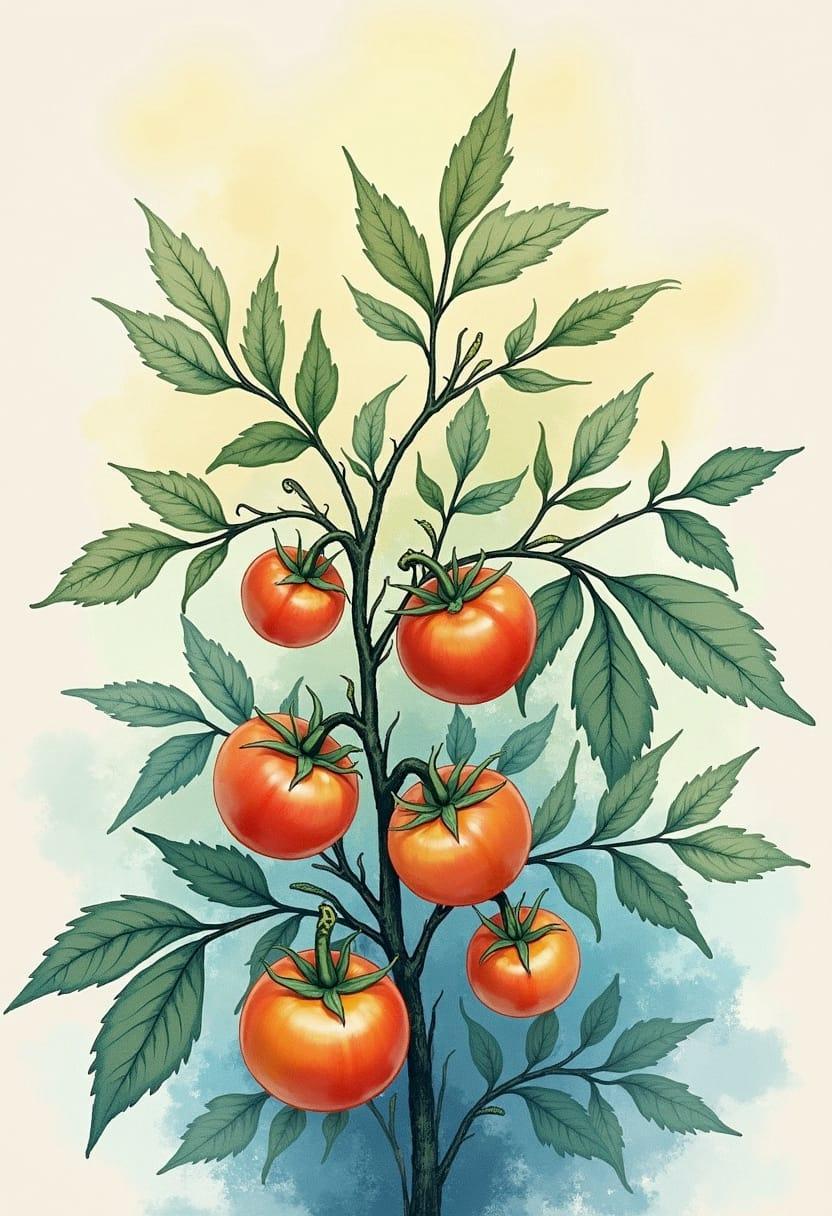Pictures of purple tomatoes
- Caricature /
- Tomato picture /
- Pictures of purple tomatoes

Purple tomatoes get their rich color from anthocyanins, the same antioxidants that give blueberries their blue shade. These tomatoes were first bred by crossing wild purple species with regular tomatoes to boost their health benefits. Seeing pictures of purple tomatoes often surprises people because purple isn’t a typical tomato color.

Purple tomatoes can have a sweeter taste than the usual red ones, making them a favorite in salads. Anthocyanins not only give purple tomatoes their color but may also help protect the fruit from sun damage. Some gardeners love growing purple tomatoes because their unique color adds visual interest to any garden.

In pictures of purple tomatoes, you can spot variations from deep violet to almost black, depending on the variety. Purple tomatoes are often richer in vitamins A and C compared to standard red tomatoes. Because of their antioxidant power, purple tomatoes are studied for possible benefits against inflammation and heart disease.

Purple tomatoes are sometimes called "Indigo Rose," a popular variety developed to have high anthocyanin content. The skin of purple tomatoes tends to be thicker, which helps the fruit last longer after harvest. In some cultures, purple tomatoes are used in traditional recipes to add a unique twist on classic dishes.

Pictures of purple tomatoes show how their dark skin contrasts beautifully with the bright red flesh inside. Purple tomatoes were once rare but are now more widely available thanks to recent interest in superfoods. Their deep color comes from pigments that act like a natural sunscreen, protecting the plant’s cells.

Purple tomatoes are often featured in farmers' markets because they stand out among common red and yellow varieties. The anthocyanin pigment in purple tomatoes is linked to anti-cancer properties in some scientific studies. Unlike many hybrids, purple tomato varieties can be heirloom, passed down through generations of gardeners.

Some chefs seek out purple tomatoes for their dramatic look and slightly smoky flavor in gourmet dishes. Pictures of purple tomatoes often highlight their glossy skin, which is less common in standard tomato types. Purple tomatoes can also have a slightly firmer texture, making them excellent for slicing.

Purple tomatoes need plenty of sunlight to develop their deep color fully. Scientists have used genetic techniques to boost anthocyanin levels, inspired by these natural purple tomatoes. These tomatoes are part of a growing trend to add colorful fruits and veggies back to the dinner plate.

The purple color sometimes fades when the tomato is cooked, but the taste remains rich and unique. Purple tomatoes have inspired artists and photographers because their colors create striking images. Their unusual look helps promote biodiversity in gardens, supporting more varied pollinators.

Because of their antioxidant content, purple tomatoes are sometimes called “super tomatoes” by nutrition enthusiasts. Pictures of purple tomatoes online often attract attention from gardeners curious about growing them. The flavor profile can vary widely, from tart to sweet, depending on the growing conditions.

Some purple tomato varieties originated in the Andes, where wild purple tomatoes still grow. The rich color signals a high level of flavonoids, which contribute to health benefits and taste. Purple tomatoes add eye-catching color to dishes without artificial dyes or additives.

Farmers growing purple tomatoes sometimes market them as gourmet or specialty produce. The contrast between purple skin and red flesh in pictures of purple tomatoes highlights their dual beauty. Purple tomatoes can sometimes appear almost black when fully ripe.

Because purple tomatoes contain anthocyanins, they may help boost immunity and reduce oxidative stress. Gardeners appreciate purple tomatoes for their resistance to certain pests and diseases. Purple tomato seeds are increasingly popular in seed catalogs for home gardeners.

The genetic makeup behind purple tomatoes involves combining traits from wild and cultivated species. The pigment responsible for purple coloration also provides some protection against cold temperatures. Purple tomatoes are often smaller than typical slicing tomatoes but pack a flavorful punch.

Many food photographers use pictures of purple tomatoes to add visual excitement to healthy eating campaigns. Purple tomatoes can be eaten raw, cooked, or even dried while keeping their unique flavor. The deeper the purple, the more anthocyanins present, making these tomatoes nutritional powerhouses.

Purple tomatoes sometimes grow in clusters that look like little jewels hanging from the vine. Some studies suggest eating purple tomatoes may improve heart health more than regular red tomatoes. These tomatoes often ripen later than red varieties, making them a late-season garden treat.

Pictures of purple tomatoes can inspire gardeners to experiment with unusual vegetable colors. Anthocyanins not only give color but also act as anti-inflammatory agents in the human body. Purple tomatoes are featured in some urban farming projects focusing on nutrient-dense crops.

The popularity of purple tomatoes has led to new hybrid varieties with even richer colors and flavors. Purple tomatoes add color diversity to the plate, encouraging people to eat more fruits and vegetables. In some regions, purple tomatoes are celebrated during harvest festivals for their unique look and taste.

Some purple tomato varieties glow slightly under ultraviolet light due to their high pigment content. The antioxidants in purple tomatoes may help slow aging and promote skin health. Purple tomatoes can be grown in containers, making them accessible for urban gardeners.

Purple tomatoes challenge the idea that all tomatoes must be red, expanding what we expect from this everyday fruit. Their striking color and health benefits make pictures of purple tomatoes popular in food blogs and nutrition sites. Gardeners growing purple tomatoes contribute to conserving genetic diversity among tomatoes worldwide.
